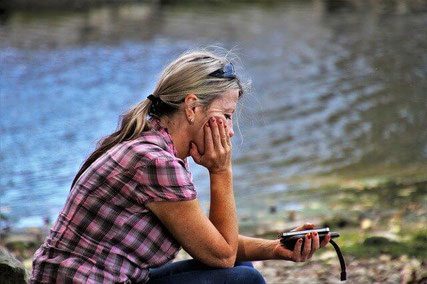
Imagine two students get disappointing exam results. Student A thinks, “Oh well. I feel crappy but I did my best, that’s all I can do”. Student B thinks, “I messed up again, I’m such a failure.”
Simple examples like this show it’s not the situation that primarily determines our feelings; it’s how we think about the situation. Student A treats herself with compassion, whereas Student B beats herself up.
Why?
As children, we all develop certain ideas about ourselves, about others, about the world. These core beliefs shape how we view situations, influencing our thoughts, feelings and behaviours. These core beliefs can profoundly shape our lives – sometimes for the better (if you have positive core beliefs), sometimes for the worse (if you have negative core beliefs). Negative core beliefs are overgeneralised, rigid and prejudiced. They are not true, but they feel true.
A very good example of this prejudicial thinking can be seen in a therapist training video by CBT (cognitive behavioural therapy) expert Dr Judith Beck. In it, Dr Beck is talking to Mary, a socially anxious and avoidant young woman. Mary was physically and emotionally abused by her mother as a child, and grew up believing she was defective.
In the video, Dr Beck asks Mary to think of some recent events that triggered this core belief that she is defective. Mary refers to an incident at work, where she dropped jars which then smashed everywhere. She also mentions how she met some girls from her neighbourhood at her workplace. Mary felt awkward and didn’t know what to say to them; again, she felt defective afterwards.
Now, these are small incidents that someone else might not pay any heed to. As Dr Beck explains, almost anything that happens to Mary that she can possibly take to mean that she is defective, is taken as proof that she is in fact defective. She doesn’t even stop to think about it, it’s automatic. The jars drop, “I’m defective”. An awkward experience with the girls, “I’m defective”.
DISCOUNTING THE POSITIVES

Dr Beck then asks Mary to think of an example that if she (Dr Beck) had seen it, she would say, “Hey Mary, that’s some positive data that shows you’re OK”. Mary thinks for a minute before mentioning how she talked to a barista in a cafe and how she laughed at a comment Mary made. Dr Beck then asks: did you feel better about yourself afterwards? No, said Mary, she still felt defective. People ‘do things like that all the time’, she said. Besides, ‘it was really hard for me’, she added.
Mary mentions another example, where she was at a library and asked for help finding a good book to read. Again, the positive data (being willing to ask for help) got ignored; Mary ‘still felt defective because I got really nervous’. Dr Beck notes that Mary automatically discounts anything that contradicts her negative self-image; positives get turned into negatives.
Dr Beck then asks Mary how many times she has been late for work over the last week. Not once, says Mary; she is never late. She takes this for granted; it never dawns on her this is more positive evidence. Of course, if she had been late, she would see this as proof that she is defective.
The belief that she is defective is incredibly strong, notes Dr Beck. The positives are either discounted (the barista, the library) or not even noticed (not being late for work). Mary agrees that Dr Beck has a point.
Dr Beck then asks, have you interpreting situations like this over the last few weeks? Yes, replies Mary. Have you been doing it all year? Yes. In your 20s? Yes. In secondary school? Yes. Even further back than that? Yes.
A question for anyone who has read this far: do you relate to this? If so, can you see how these negative core beliefs are distorting reality, hour after hour, day after day, week after week, year after year?
A prejudice is when you hold onto a belief very strongly, says Dr Beck, even in the face of much contradictory evidence. Aim to start tackling this prejudice. Remember that negative core beliefs are not true – they just feel true.
(First published in Southern Star on 22/04/2021)